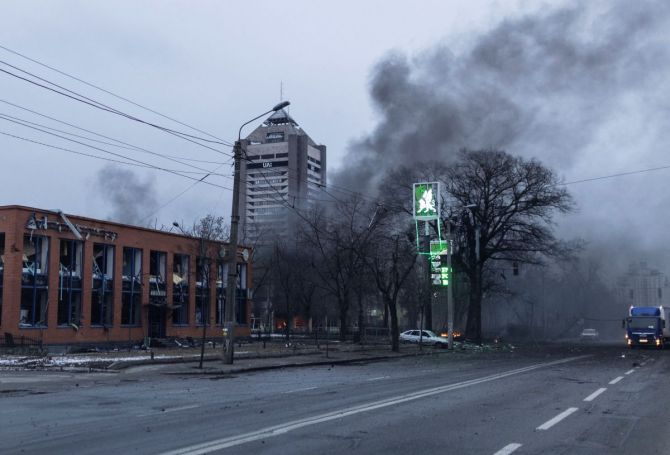Russian forces' movement towards the Ukrainian capital city of Kyiv is currently 'stalled', a senior United States defence official said on Wednesday.

Russia's advance on Kyiv is 'where it was yesterday', the official told reporters, citing a variety of factors, including lack of food for Russian troops.
Russians are not only facing 'fuel and sustainment' problems but are showing signs that they are running out of food, the official claimed, adding that the Ukrainian 'resistance' also could be a possible reason for the stall.
The official noted that Russia's current lack of progress may not be only due to problems arising from resistance or their own logistics and they are 'possibly regrouping, rethinking, reevaluating' before carrying on again.
"They (Russia) will regroup, they will adjust, they will change their tactics," the official said, adding that the Russian defence ministry openly admitted it would target civilian areas in Kyiv.
According to the official, Russia has committed more than 80 per cent of its pre-staged combat power in Ukraine.
Russia has launched more than 400 missiles at Ukrainian targets so far.
The official also noted that the Russian military appears to be 'risk averse' when it comes to its own troops.
"There has been in the last six days evidence of a certain risk averse behavior by the Russian military," the official said.
"You have seen it on the ground, where units are surrendering, sometimes without a fight. And they have got, a lot of these soldiers are conscripts, never been in combat before, some of whom we believe were not even told they were going to be in combat. So we're just seeing evidence of a bit of risk aversion."
Despite Russia's vastly larger armed forces, Ukraine's airspace remains contested, with President Volodymyr Zelenskyy's country currently mounting a viable defence, the senior defense official said.
As in the first days of the war, Russia's military appears to be having more success in southern Ukraine, the official said.
Russia continues to concentrate attacks on the large cities of Kyiv and Kharkiv.
Russian forces launched military operations in Ukraine on February 24, three days after Moscow recognised Ukraine's breakaway regions -- Donetsk and Luhansk -- as independent entities.
Several countries including the United Kingdom, the US, Canada, and the European Union have condemned Russia's military operations in Ukraine and imposed sanctions on Moscow.
These countries have also promised Ukraine to help with military aid to fight Russia.
The US, Canada and European allies agreed to remove key Russian banks from the interbank messaging system, SWIFT which means Russian banks won't be able to communicate securely with banks beyond Russia's borders. President Putin has also signed a decree on special economic measures against the US and its allies.
Fighting in Ukraine has so far pushed more than 500,000 people across the country's borders, according to the UN refugee agency.
Speaking at an emergency session of the UN General Assembly on February 28, Russia's Permanent Representative to the United Nations, Vasily Nebenzya, had said that Russia has no plans to occupy Ukraine.
On February 28, negotiations between delegations of Russia and Ukraine were held in the Gomel Region of Belarus and another round of talks is scheduled for March 2.
Meanwhile, Kyiv Mayor Vitali Klitschko said that Russians are on the outskirts of the capital city.
In a video message, Klitschko said, "The enemy is on the outskirts of the capital," adding that the Ukrainian military is 'preparing to defend Kyiv'.
"Our armed forces, Territorial Defence Forces, are fighting heroically for our land," Klitschko said.
"Fortifications and checkpoints have been built at the entrances to the city. I ask everyone to keep calm. Do not go outside unnecessarily and stay in shelters in case of alarm," he added.










